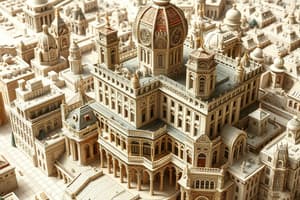Podcast
Questions and Answers
Who is the creator of the Southeast Asian City Model?
Who is the creator of the Southeast Asian City Model?
- T.G. McGee (correct)
- Chauncey Harris
- Homer Hoyt
- Ernest W. Burgess
What year was the Southeast Asian City Model created?
What year was the Southeast Asian City Model created?
1967
What is another name for the Southeast Asian City Model?
What is another name for the Southeast Asian City Model?
McGee Model
Who created the Concentric Zone Model?
Who created the Concentric Zone Model?
What is the year associated with the Concentric Zone Model?
What is the year associated with the Concentric Zone Model?
What other name is the Concentric Zone Model known by?
What other name is the Concentric Zone Model known by?
Who is the creator of the Sector Model?
Who is the creator of the Sector Model?
In what year was the Sector Model created?
In what year was the Sector Model created?
What is another name for the Sector Model?
What is another name for the Sector Model?
Who created the Peripheral Model?
Who created the Peripheral Model?
In what decade was the Peripheral Model created?
In what decade was the Peripheral Model created?
What is another name for the Peripheral Model?
What is another name for the Peripheral Model?
Who are the creators of the Latin-American City Model?
Who are the creators of the Latin-American City Model?
What year was the Latin-American City Model developed?
What year was the Latin-American City Model developed?
What is another name for the Latin-American City Model?
What is another name for the Latin-American City Model?
Who created the Multiple-Nuclei Model?
Who created the Multiple-Nuclei Model?
In what year was the Multiple-Nuclei Model created?
In what year was the Multiple-Nuclei Model created?
Who created the Central Place Theory?
Who created the Central Place Theory?
What year was the Central Place Theory developed?
What year was the Central Place Theory developed?
Who is the creator of the African City Model?
Who is the creator of the African City Model?
What year was the African City Model created?
What year was the African City Model created?
Flashcards are hidden until you start studying
Study Notes
Southeast Asian City Model
- Created by T.G. McGee in 1967.
- Demonstrates land-use patterns in medium-sized cities of Southeast Asia.
- Also known as the McGee Model.
- Example: Malaysia, which has followed the model for successful growth.
Concentric Zone Model
- Formulated by Ernest W. Burgess in 1925.
- Details a city's internal structure divided into concentric rings.
- Central Business District (CBD) is at the center, surrounded by manufacturing and working-class districts.
- Also referred to as the Burgess Model.
- Example: New York City exhibits this model's structure.
Sector Model
- Developed by Homer Hoyt in 1939.
- Proposes that urban areas develop in sectors rather than rings, with each sector representing different social groups.
- Also known as Hoyt's Model.
- Example: Chicago is organized into sectors, with major companies centralized and lower-income residents located in surrounding areas.
Peripheral Model
- Created by Chauncey Harris in the 1960s.
- Examines suburban neighborhoods that surround an inner city, connected by commercial nodes.
- Often referred to as the Galactic City Model (an updated version).
- Describes a dispersed metropolitan landscape similar to the multiple-nuclei model.
European City Model
- Creator and date remain unspecified.
- Exemplifies the growth pattern of European cities, influenced by medieval and pre-industrial structures.
- Typically features a historically significant CBD and diverse, densely populated suburbs.
Urban Realms Model
- Developed by James Vance in 1964.
- Illustrates a late 20th-century large U.S. city as a multicentered metropolis with independent realms.
- Includes a diminished central realm centered around the CBD.
- Example: Istanbul, which showcases different realms around a central CBD.
Latin-American City Model
- Formulated by Ernest Griffin and Larry Ford in 1980.
- Merges elements of Latin American culture with globalization, featuring radial sectors and concentric zones.
- Highlights a thriving CBD with a declining quality of housing away from the center, notably in disamenity sectors.
- Example: Panama City reflects this model, enhancing its role as a major trade hub.
Multiple-Nuclei Model
- Created by Chauncey Harris and Edward Ullman in 1945.
- Represents urban structure as a collection of nodes or activity centers, with no fixed sector pattern.
- Example: Mumbai, which has various social groups dispersed throughout without adhering strictly to sectors.
Central Place Theory
- Formulated by Walter Christaller in 1933.
- Explains the distribution of cities and their market areas based on size and spatial interactions.
- Applicability spans across various geographical contexts.
African City Model
- Conceived by Harm De Blij in 1962.
- Characterized by three CBDs: colonial, traditional, and market zones, with varying architectural styles.
- Surrounding areas typically consist of ethnic neighborhoods, industries, and poor squatter settlements.
- A general model accounting for the diversity and rapid growth of African cities, combining aspects of the sector and concentric zone models.
Studying That Suits You
Use AI to generate personalized quizzes and flashcards to suit your learning preferences.




